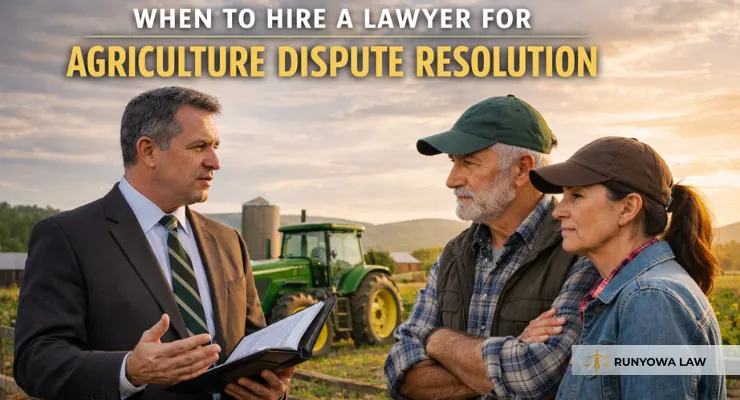Running a farm today means navigating more than weather forecasts and crop cycles — it’s also about managing contracts, government regulations, land disputes, and environmental compliance. That’s where an agriculture lawyer steps in. Whether you’re a family farmer, agribusiness owner, or land investor, having a lawyer for farmers ensures your rights, assets, and operations are fully protected under the law and agriculture. From land acquisition to labor issues, an agriculture lawyer safeguards your livelihood and keeps your business legally resilient for the future.
Introduction
Farming is more than just planting seeds — it’s a full-scale business operation that involves contracts, land leases, government programs, and complex legal requirements. In this landscape, having an agriculture lawyer isn’t optional anymore; it’s essential.
As a farmer, you might find yourself juggling multiple responsibilities — negotiating with suppliers, managing employees, and complying with ever-changing agricultural laws. A dedicated lawyer for farmers acts as your strategic partner, helping you understand how law and agriculture intersect in your daily operations.
Whether you’re dealing with a land dispute, environmental compliance issue, or an agribusiness contract gone wrong, your agriculture lawyer ensures you stay legally protected, financially secure, and future-ready.
Understanding the Role of an Agriculture Lawyer
An agriculture lawyer is a legal professional who specializes in the law and agriculture sector, offering advice, representation, and advocacy for farmers, ranchers, agribusinesses, and agricultural workers.
They understand both legal complexities and farming realities, blending legal acumen with practical insights about rural land, environmental policy, and business operations.
Key Responsibilities Include:
- Drafting and reviewing farm contracts
- Advising on land use and zoning regulations
- Handling disputes and litigation
- Assisting with estate planning for family farms
- Navigating environmental compliance
- Managing labor and employment law for farmworkers
Their goal? To keep your business running smoothly while minimizing risks — legal, financial, and operational.
1. The Intersection of Law and Agriculture
The relationship between law and agriculture is a delicate dance. Agriculture is deeply rooted in the economy, but it’s also heavily regulated. Everything from what fertilizers you use to how you treat livestock can fall under specific laws.
Governments around the world have established a mix of federal, provincial, and local laws that govern agricultural production, environmental standards, land ownership, and even food safety.
Your agriculture lawyer interprets these laws and ensures your farm’s operations remain compliant. They act as a bridge between your business goals and the legal boundaries you must operate within.
2. Protecting Your Land and Property Rights
Land is the heart of every farm — and protecting it is the foundation of your business. Unfortunately, disputes over boundaries, easements, and ownership are all too common.
An experienced lawyer for farmers can:
- Review purchase agreements before you buy or lease farmland
- Resolve boundary or zoning disputes
- Protect your water rights and mineral rights
- Assist in land succession planning
For example, if your neighbor’s drainage system affects your crops or a corporation tries to acquire your farmland, your agriculture lawyer steps in to defend your interests.
Legal protection of farmland ensures stability for generations.
3. Drafting and Reviewing Agricultural Contracts
Contracts are the backbone of every successful farming operation. You enter into agreements for seeds, equipment, distribution, transportation, and employment. Each one carries legal obligations and risks.
A skilled agriculture lawyer ensures your contracts are airtight — clear, enforceable, and beneficial. They’ll help you avoid hidden clauses, unfair terms, and potential disputes.
Common farm-related contracts include:
- Land lease agreements
- Supplier and vendor contracts
- Crop sale contracts
- Livestock purchase agreements
- Partnership or co-op agreements
When these documents are handled by a professional who understands both law and agriculture, you’re not just signing — you’re safeguarding your business future.
4. Navigating Government Regulations and Compliance
The agricultural industry faces constant scrutiny from regulatory agencies. Between environmental laws, pesticide usage rules, and food safety standards, staying compliant is a major task.
A knowledgeable lawyer for farmers stays updated on these evolving laws and ensures your business doesn’t unintentionally violate them.
They can help you:
- Secure necessary permits and licenses
- Prepare for audits or inspections
- Ensure compliance with labor and environmental laws
- Apply for agricultural subsidies or government programs
By proactively managing compliance, you avoid hefty fines, shutdowns, or reputational harm.
5. Handling Agricultural Disputes and Litigation
Even the most diligent farmers face legal disputes — sometimes with suppliers, contractors, neighbors, or even government entities.
Your agriculture lawyer represents you in:
- Land or boundary disputes
- Contract breaches
- Employment disputes
- Environmental violations
- Product liability claims
With a strong legal advocate, you won’t be left vulnerable in court or mediation. Instead, your lawyer ensures that your story is heard, your interests defended, and your farm’s reputation protected.
6. Managing Labor and Employment Issues on the Farm
If you employ farmhands, seasonal workers, or administrative staff, you must comply with employment laws. This includes wage regulations, safety standards, and immigration compliance.
An agriculture lawyer ensures your hiring practices and payroll systems align with legal requirements.
They can help you:
- Draft employment contracts
- Navigate workers’ compensation claims
- Address labor disputes or grievances
- Comply with workplace safety laws
A lawyer for farmers acts as your HR safety net — keeping your workforce compliant and your business protected from costly lawsuits.
7. Environmental and Sustainability Law Compliance
Modern farming is closely tied to environmental stewardship. Governments impose strict rules to preserve soil health, manage water usage, and prevent pollution.
A specialized agriculture lawyer helps you understand and implement environmental compliance — from pesticide management to waste disposal.
They ensure your farm operates sustainably and within the law, helping you:
- Secure environmental permits
- Defend against alleged violations
- Manage water rights
- Implement eco-friendly farming practices
Balancing profit with environmental responsibility is tough — but with the right legal support, it’s absolutely achievable.
8. Estate Planning for Farmers and Agricultural Families
For many, a farm is not just a business — it’s a family legacy. But without proper estate planning, succession disputes can threaten that legacy.
An experienced lawyer for farmers helps you plan ahead:
- Draft wills and trusts
- Transfer ownership smoothly to the next generation
- Minimize estate taxes
- Prevent inheritance conflicts
By addressing these issues proactively, you ensure your farm stays in the family, protected by both the law and your values.
9. Agricultural Cooperatives and Business Structuring
Choosing the right business structure — whether as a sole proprietorship, partnership, LLC, or cooperative — directly impacts your legal liability, taxation, and operations.
An agriculture lawyer provides tailored advice to set up your farm in a way that best suits your goals and growth plans.
They help you:
- Register your business legally
- Draft partnership or shareholder agreements
- Protect personal assets from business liabilities
- Optimize your tax position
In essence, they help turn your farm into a smart, legally sound enterprise.
10. Risk Management and Insurance Guidance
Farming is unpredictable — one bad season or legal issue can jeopardize your entire livelihood. That’s why risk management is vital.
Your agriculture lawyer works alongside insurance experts to assess vulnerabilities and recommend protection strategies.
They’ll guide you through:
- Crop and livestock insurance
- Liability coverage
- Equipment and property protection
- Contractual risk mitigation
When disaster strikes — natural or legal — having a strong legal advisor ensures you recover faster and smarter.
11. Technology, Innovation, and Modern Farming Laws
The farming industry is rapidly modernizing with drones, AI-driven machinery, and digital contracts. But innovation brings new legal challenges — from intellectual property rights to data privacy.
An agriculture lawyer helps you navigate this new frontier by:
- Protecting your innovations and patents
- Reviewing technology licensing agreements
- Managing data privacy compliance
- Handling disputes involving agri-tech tools
Technology might change how you farm, but law ensures it’s done fairly and securely.
12. How to Choose the Right Agriculture Lawyer
Finding the right lawyer for farmers requires more than just legal credentials. You need someone who understands the rhythm of farm life and the complexity of agricultural law.
Checklist for Choosing the Right Lawyer:
- Proven experience in law and agriculture
- Familiarity with local farming laws and land use regulations
- Transparent communication and billing
- Strong negotiation and litigation skills
- Client-focused approach
The best agriculture lawyers don’t just interpret the law — they understand the soil it grows from.
13. The Financial Benefits of Hiring an Agriculture Lawyer
You might think hiring a lawyer adds costs — but in truth, it saves money long-term. By preventing disputes, avoiding fines, and optimizing your contracts, an agriculture lawyer directly contributes to your profitability.
They identify loopholes, manage taxes, and help you secure subsidies or government grants that you might otherwise miss. It’s not just about legal protection — it’s about smarter financial management for your farm business.
14. Building Long-Term Legal Resilience for Your Farm
Legal protection is not a one-time task — it’s an ongoing relationship. Laws evolve, business models change, and new challenges arise. Having a dedicated lawyer for farmers ensures your farm business remains legally resilient through it all.
Your agriculture lawyer becomes part of your strategic team — advising on expansions, land acquisitions, and succession plans. With their guidance, you’re not just surviving in the farming industry; you’re thriving confidently within the law.
Conclusion: Your Farm, Your Future, Protected
Your farm represents years — often generations — of hard work, heritage, and dedication. But without legal protection, it can all unravel in a moment.
Partnering with a seasoned agriculture lawyer ensures every seed you plant and every acre you manage is backed by solid legal foundations.
Whether you’re negotiating contracts, managing land issues, or planning your family’s legacy, the right lawyer safeguards your peace of mind — today and for the years ahead.
Frequently Asked Questions (FAQs)
1. What does an agriculture lawyer do?
An agriculture lawyer handles all legal aspects of farming — from land ownership, environmental compliance, and contracts to estate planning and disputes.
2. Why do farmers need a lawyer?
Farmers face numerous legal challenges, including zoning laws, labor disputes, and government regulations. A lawyer for farmers ensures full legal compliance and risk protection.
3. Can an agriculture lawyer help with environmental issues?
Yes. Agriculture lawyers assist with environmental permits, compliance, and defending against alleged violations related to land and water use.
4. How can I find the best agriculture lawyer for my farm?
Look for experience in law and agriculture, local expertise, transparent communication, and a client-first approach.
5. Is hiring an agriculture lawyer expensive?
It’s an investment that often saves money in the long run by preventing disputes, fines, and costly legal mistakes.




